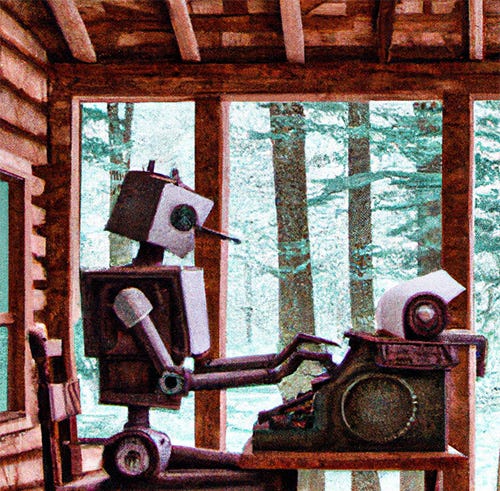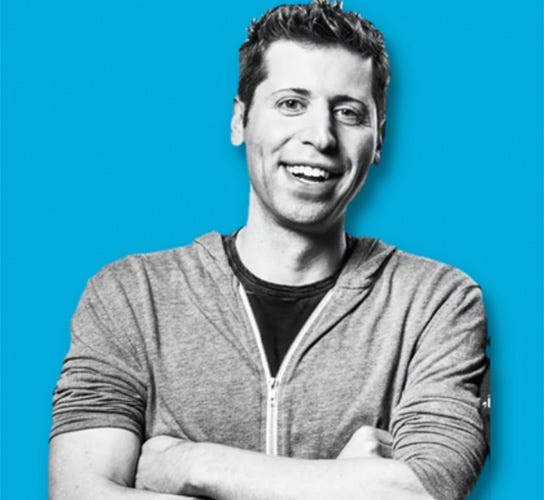The Tech Bro Coming After Your Job
Meet Sam Altman, CEO of OpenAI and Creator of ChatGPT (Extra! Extra!)
Welcome to my first paid subscriber post. It’s a dandy. Free subscribers will be able to read a portion before hitting that concrete paywall. It’s easy to surmount, however, just punch the button below:
Today, I’ll be focusing on a subject very close to my heart—writing—and the individual who would see me replaced. Unless you wisely avoid the daily news barrage, there’s little chance you’ve avoided hearing about ChatGPT, the revolutionary AI-driven generative text machine. As said machine describes itself, when prompted: “ChatGPT is a type of language model that uses machine learning to generate human-like text. It works by analyzing and understanding patterns in large amounts of text data, and then using that understanding to generate new outputs.”
As an individual who’s made a living with words, I have skin in the game on whether or not AI will replace writers. Here’s what ChatGPT has to say about the matter:
Artificial intelligence has the potential to automate certain writing tasks, such as generating news articles or composing simple emails. However, it is unlikely that AI will fully replace human writers in the near future.
One of the reasons is that AI-generated text often lacks the creativity and nuance of text written by humans. AI systems can generate text based on patterns and data, but they may not understand the meaning or context of the text in the same way that a human writer would.
Additionally, AI may not be able to capture the unique voice and style of a human writer.
Another reason is that writing is a complex task that requires not only the ability to generate text but also the ability to understand and interpret ideas, emotions and cultural references.
Moreover, writing is an art, it's about telling stories, expressing emotions and giving meaning to things, something that machines are yet to learn.
In summary, while AI may be able to assist human writers in some tasks, it is unlikely to fully replace them in the near future.
Excuse me if this anodyne statement comes as cold comfort to me. Back in Edison’s days, that was like the electric bulb telling the candle that everything would be okay. Pretty soon, you’re just mood lighting, brought out on special occasions, then shoved back to a dark drawer only half your previous size. ChatGPT may not be up to the task of complicated metaphor…yet… but “near future” is a phrase with a whole lot of leeway.
With everything that I’ve heard about ChatGPT, and I’m already taking an online course on using it effectively, I was curious to know about the 37-year-old individual behind its creation. Who is Sam Altman? Why is he coming after my job?
I had the machine spit out an answer with the prompt: “Write a 500-word biography of Sam Altman.” The result was grammatically correct, but also stolid, repetitive, and hagiographic. If I was a conspiracy theorist, I’d wonder if Mr. Altman had hard-coded the lines that he was “known for his philanthropic efforts” and/or “despite his busy schedule, Altman also makes time for his personal interest, including playing the piano, reading, and traveling.”
That’s the last time I’ll include AI writing in this post. There’s been plenty of my brethren, including recently Maureen Dowd in the New York Times, who used ChatGPT to show how adept it might be in filling our proverbial shoes. Instead, here is my Luddite version of that short biography.
Born on April 22, 1985, Sam Altman was raised in an upper-middle-class Jewish family in the ‘Show Me State’. That’s Missouri for those unacquainted with state mottos. More specifically, he grew up in the suburbs of St. Louis (like yours truly). For those who do not know the city, the single most identifying question to ask a fellow native is: What high school did you attend? Typically, the answer will tell you a great deal about an individual. Sam attended John Burroughs, a progressive (some would say ‘hippy-dippy’) college preparatory school in the city’s toniest of suburbs, Ladue. It’s also the top-ranked private school in St. Louis and known for producing strivers, most of whom were arguably already starting on third base. It’s a privilege that Altman acknowledges.
For Sam’s eighth birthday, his parents bought him a MAC LC2, a Maserati of computers at the time with a price tag to match. Sam installed it in his bedroom, and as he recalls, “this was the dividing line in my life: before I had a computer and after.” Not only had he found a passion, but the Internet was a lifeline in his struggles over being gay. “I didn’t have anyone I could talk to about that,” Sam says. “So having the Internet was this unbelievable thing. Just having the human connection, where you can talk about something that no one from your real-world would understand, was just unbelievably powerful.”
Keep reading with a 7-day free trial
Subscribe to Work/Craft/Life to keep reading this post and get 7 days of free access to the full post archives.



